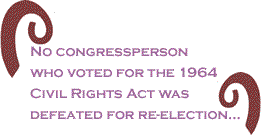
|
||||||||||||||||||||||
 |
||||||||||||||||||||||
 |
||||||||||||||||||||||
 |
||||||||||||||||||||||
 |
||||||||||||||||||||||
 |
||||||||||||||||||||||
 |
| The current issue is always free to everyone |
|
|
 |
Part I Every four years a contentious debate takes place in the Democratic Party, a debate between centrists and liberal Democrats over campaign strategy for seizing and holding the White House. John Kerry, for example, the last candidate to snatch defeat from the jaws of victory, became a centrist in the final months of the presidential race in 2004. Will Barack Obama, who ran a brilliant primary campaign, follow Kerry’s move-to-the-right strategy in the last days of the election? What, after all, is the centrist position in regards to strategy? And what does the history of centrism tell us about driving in the middle of the road? We need perspective. We need an overview and a sense of history. Ever since the demise of the once-progressive Johnson Administration in 1968, when a lawless war on Vietnam destroyed the hopeful war on poverty, centrist Democrats have blamed the misfortunes of the Democratic Party in national politics on excessive liberalism, on progressive politics that appear too radical for the general population. Centrists claim that only by moving the party to the right, co-opting the military postures and market ideology of the Republicans, can Democrats regain the White House. The centrist theory, so often repeated in media commentary, contradicts the historical record - not only the record of three successive defeats in presidential elections of the 1980s, when the Party shifted to the right - but the overall record of Democratic presidents from Roosevelt to Carter. Since 1932, Democratic presidential candidates have achieved five landslide victories, and all five landslides were created through progressive campaigns that identified the Democratic Party with movements for social reform. The four campaigns of Franklin Roosevelt and the landslide victory of Lyndon Johnson in 1964 were grand coalition campaigns. These populist mobilizations did not dwell on the white middle-class alone. Nor did they fawn over lost Democrats. Instead they reached beyond the party establishment to the unemployed, to the poor, to the new, rising electorate of the times. With only one telling exception, no Cold War Democratic candidate ever won a decisive majority of the popular vote. Truman got 49.5 percent in 1948; Kennedy got 49.9 percent in the squeaker of 1960. Carter got a bare majority over Ford in 1976, a result of public hostility over Watergate. The one candidate who did sweep the country was Lyndon Johnson, and he made support for civil rights central to his plans for the Great Society. The great Democratic victories (Roosevelt and Johnson) were all progressive, highly ideological crusades against poverty and injustice.
McCarthyism and War Crippled Truman As a New Dealer, Truman was popular, but Truman made a right-wing shift away from FDR: his establishment of a conservative cabinet, his use of troops and injunctions against steel workers and miners on strike, the red-baiting of Henry Wallace, the State Department persecution of Paul Robeson, the reactionary government loyalty oath that paved the way for the rise of McCarthyism, and the Korean War, especially the disastrous march to the Yalu River on China’s border. All this split the Democratic Party, confused the electorate, emboldened the Republicans, and brought Truman’s demise. Clay Blair summed up the effect of Truman’s right-wing shift in The Forgotten War: America in Korea. The war “fostered a national climate which strengthened the appeal of McCarthyism and similar repressive ideologies and unseated the Democratic Party, which had held the White House for 20 years.” Trapped in his own undeclared land war in Asia, Truman was so unpopular by 1952 that he declined to run for a second term. And the Democratic Party leadership had become so militaristic that the Republican adversary, Dwight D. Eisenhower, outflanked the Democrats from the left! When Eisenhower promised to end the Korean War - “the time has come to bring our boys home” - Adlai Stevenson lost any chance for victory. Johnson Won as A Dove, Lost as a Hawk This same pattern repeated itself in 1968 when Democrats were trapped in “Johnson’s war” in Vietnam. The rise and fall of Lyndon Johnson is full of lessons that centrist Democrats overlook. Centrists ignore the progressive character of Johnson’s historic landslide of 1964, and they overlook the right-wing causes for Johnson’s humiliation, the self-destruction of the Democratic Party in 1968. It was a progressive, not a centrist strategy, which set off the landslide of 1964. Johnson did not “hug the center.” He used a mass, grand coalition strategy similar to FDR. Three progressive themes - peace, commitment to ending poverty, full civil rights - dominated the 1964 campaign. “We can’t just push a button,” Johnson would say at his campaign stops, “and tell an independent country to go to hell. We cannot keep the peace by bluff and bluster and ultimatums.” Johnson also challenged the conservative premise that mass poverty is the fault of the poor, a permanent part of American society.
As early as the 1950s, the centrist approach already had a record of failure. Adlai Stevenson, the experienced governor of Illinois, cultivated a liberal image, but practiced a centrist strategy in his campaigns. During the 1956 campaign against Eisenhower, a black woman asked Stevenson to take a clear stand on the historic Supreme Court ruling against segregated schools. Stevenson, who became a two-time loser, refused to support the use of federal troops to enforce the ruling. He even reached an agreement with Eisenhower to keep the issue of race and segregation - an issue on the minds of all Americans - out of the campaign. As a result of default on civil rights, Stevenson lost by a bigger margin in 1956 than in 1952. By 1960 it was becoming clear that Democratic candidates could not win presidential elections, much less a real popular mandate, by running away from civil rights. In the Kennedy campaign of 1960, a mere phone call to Coretta King on behalf of Dr. King in jail may have been a determining factor in Kennedy’s slim victory. Johnson wisely did not repeat the mistakes of Stevenson. Johnson even went beyond FDR, Truman, and beyond Kennedy on civil rights, passing the historic Civil Rights Act of 1964, then attacked Goldwater for his opposition to the 14th amendment. No congressperson who voted for the 1964 Civil Rights Act was defeated for re-election, and eleven members of Congress who voted against the Civil Rights Act (out of 22 Northern congressmen) were defeated for re-election. The Johnson campaign discredits the prevailing “white-flight” theory, not only in contrast to Stevenson’s defeats, but also in contrast to the subsequent centrist campaigns of Mondale and Dukakis, former liberals who tried to play down civil rights. Since the end of World War II, Johnson has been the only Democratic candidate to win a majority of white voters. In the post-Johnson period, it was the Democratic Party’s default on civil rights, not identification with black progress, that made the Republican “Southern strategy” successful. When Democrats keep faith with progressive traditions, when they stand on principle, the Republicans become the whiners and weaklings, like Goldwater in 1964. Theodore White, award-winning conservative chronicler of post-war national campaigns, called the Johnson bid in 1964 “the most successful campaign in all American history.” The enlightened, progressive tone of the campaign, its connection with grass-roots movements outside the official Democratic Party, garnered 61 percent of the popular vote, the largest percentage at that time in U.S. history.
To be sure, the Johnson campaign did not take place in a vacuum. Democratic leaders resisted change and only took progressive positions under pressure. Electoral campaigns that reflect the aspirations of democratic-minded voters will rarely succeed unless they are backed by an aroused, active movement. The anti-nuclear movement and the civil rights movement were decisive parts of the Johnson landslide. Reluctant at first, the Democratic Party leadership finally identified the party with movements for social reform, and they portrayed those movements, not as “special interests,” (as centrists treat them today), but as just causes of concern to all Americans. So long as the leadership of the Democratic Party upheld its progressive mandate, the credibility of the party remained high. Lyndon Johnson, once a segregationist himself, earned worldwide respect for the passage of the Voting Rights Act of 1965, and commended the freedom fighters who marched in Selma and sang “We Shall Overcome.” In January 1966, Johnson and Congress got unprecedented high ratings in the polls for liberal legislation. A Harris Poll rated public approval of the Great Society legislation: Medicare for the aged, 82 percent; federal aid to education, 90 percent, excise tax cuts, 92 percent; the Voting Rights Act, 95 percent. Have the centrist Democrats forgotten the somersault, Johnson’s betrayal of his own mandate? It was not the liberal agenda that precipitated the long-term decline of the Democratic Party in the 1970s. It was only after Johnson’s rightward shift, and the escalation of the illegal wars in Indochina, that mass defections from the party took place. In making fateful concessions to the generals, the Pentagon, the arms manufacturers - that “military-industrial complex” of which Eisenhower warned - the Democrats “converted the greatest mandate, the greatest personal triumph of any election, that of 1964, to the greatest personal humiliation of any sitting president.” [White] The deployment of 500,000 troops to Vietnam; the carpet bombing of North Vietnam; the CIA atrocities (like Operation Phoenix that killed 20,000 South Vietnamese civilians); the growing contempt for world opinion and the rule of law; the drafting of black and brown high school graduates whose new hopes for social progress were transformed into search-and-destroy operations abroad; the gutting of domestic programs ($6 billion cut in 1966); the war-induced inflation that stretched into the late 1970s - all caused a period of decline and disillusionment from which Americans and Democrats have yet to recover. Theodore White writes that “the confidence of the American people in their government, their institutions, their leadership, was shaken as never before…The Vietnam decisions of 1965 were to initiate a sense of helplessness in American life which no candidate could cure.” In its fatal right-wing shift, the party leadership turned its back “on all the great promises and domestic experiences of one of the most visionary administrations ever to hold helm in America.” In 1968 Hubert Humphrey, once proud of his liberal record, campaigned as Johnson’s proxy. His centrist campaign, his broken spirit, his refusal to make a clean break from Johnson’s war, his refusal to call for withdrawal of U.S. troops from Vietnam, made Nixon’s victory possible. The Republicans have a history of goading liberal Democrats into right-wing wars against Third World countries, then leaving Democrats with the results of their own folly. And once again the Republicans outsmarted the Democrats. Notwithstanding his record as a witch-hunter and war hawk, Nixon became - by default of the Democrats - the “peace” candidate. He offered a secret plan for ending the war. The Democrats, so far gone in pro-interventionist policy, were outflanked again. The Johnson betrayal made subsequent Democratic victory nearly impossible. The 1968 defeat of Hubert Humphrey, and the 1972 defeat of George McGovern, who was forced to campaign against his own Party leadership in a time of disarray - both were part of the aftermath of Johnson’s folly.
The centrist strategy today is merely a continuation of what took place in the mid-sixties when the Democratic Party made its fateful right turn. PART II Carter Goes Down With The Shah The Carter Administration was no exception to the right-wing follies of one-term Democratic presidents. Betrayal of his own human rights policy brought Carter’s own downfall. The American people first liked Jimmy Carter. They respected his stand in support of human rights, and they viewed him as a genuine humanitarian. The historic Camp David Accords generated worldwide respect and brought widespread approval at the polls. Then Carter made one of those right-wing mistakes that prove to be the undoing of the Democratic Party. There is an old saying: “Lie down with dogs, get up with fleas.” On New Year’s Eve in Tehran in 1978, at a private party in the sumptuous home of the Shah of Iran - whose SAVAK was notorious for terror and torture - Carter toasted the Shah and called Iran “an island of stability” in a troubled world. It was not long after that riots broke out, and the hated Shah was deposed. While South Africa offered asylum to the Shah, most countries, including Britain and France, closed their doors. President Carter first resisted the Shah’s requests for safe haven in the United States. After all, the U.S. Embassy in Iran had warned the president of potential repercussions if the U.S. aided the Shah, whose hopes for a counter-revolution were public knowledge. In one prophetic moment Carter asked: “What do we do if our embassy personnel are taken hostage?” But right-wing pressures on Democratic presidents are unceasing. There was David Rockefeller, whose banks held $8 billion in Iranian assets, a personal friend of the Shah. There was Henry Kissinger, mastermind of the illegal secret bombing of Cambodia for the Nixon Administration. There were the U.S. arms dealers, who concluded $15 billion in arms sales to the Shah between 1974 and 1978. All of them urged Carter to bring the Shah to the United States. All of them wanted the U.S. to promote a counter-revolution. When Jimmy Carter succumbed to the pressure, he not only reversed his own position on human rights, he touched off a crisis that ended any chance for winning the campaign of 1980. Having goaded Carter into an open alliance with the deposed Shah, Kissinger and Rockefeller never took responsibility for the subsequent disaster. They let the Democrats take the blame. Just as Eisenhower became the “peace” candidate against Truman’s Korean war, just as Nixon capitalized on Johnson’s war and Humphrey’s timidity, so Ronald Reagan got credit (the secret deals were disclosed all too late) for bringing home the hostages. Defeatism in the 1980s Antipathy to progressive politics continued to dominate the conservative, PAC-financed leadership of the Democratic Party throughout the 1980s. In 1982 for example, national party leaders, including Walter Mondale, opposed the progressive campaign of Harold Washington for mayor of Chicago. They even endorsed and worked for Washington’s right-wing opponents - Jane Byrne and Richard Daley - before Washington (who spent $1 million compared to Byrne’s $10 million and Daley’s $4 million) achieved an historic victory. The Congressional Quarterly called Mondale’s platform “economically the most conservative platform in the last fifty years.” Mondale called for cuts in social spending, higher taxes (without specification of corporate and wealthy categories), and an increased military budget. In their 1980s campaigns, both Mondale and Dukakis minimized the concerns of African Americans and Hispanics, and both degraded the peace movement and women’s movement to the level of “special interests.”
And who can forget the almost humorous stupidity of the Dukakis tank ride - his tiny, managerial head barely visible above the tank - a pitiful attempt to out-macho Bush. Centrism weakened the campaign and undermined the credibility of the Democratic Party. The Clinton years were paradoxical. As a centrist who won two terms
in office, Clinton seems to be an exception to the pattern of
centrist defeats. In reality, however, the Clinton agenda played
a destructive role in the Democratic Party. Not simply because
of unprecedented levels of White House corruption - the sale
of the Lincoln Bedroom to big contributors, the sale of pardons
to wealthy ex-cons. But because the Clinton political agenda
actually emboldened Republican greed. The appetite increases
by what it feeds on. It is no accident that Republicans swept
Congress under Clinton, who alienated labor and the Party base
when he passed NAFTA, promoting globalization and exporting
jobs to cheap labor markets abroad. The Clinton economic sanctions
against Iraq (causing half-a-million Iraqi children to die from
hunger and malnutrition) laid the basis for the subsequent occupation.
Clinton arms sales to human rights violators, from Colombia
to Indonesia; the refusal to come to the aid of Rwanda; the
de-regulation of the finance industry in 1999, a direct cause
of the current foreclosure crisis; the dismantling of New Deal
protections of labor; the end of New Deal safety nets for impoverished
women, primarily women of color; the massive expansion of the
prison complex - these are just some of the regressive Clinton
policies (well-chronicled in Howard Zinn’s People's
History of the United States: 1492 to Present (P.S.) In 2004 John Kerry ran a classic centrist campaign. He told a reporter that he voted to invade Iraq because he believed there was an imminent threat of weapons of mass destruction. However, there was a turning point when a reporter asked: Had you known there were no weapons of mass destruction, would you have voted the same way? Kerry said yes. No moral vision. No political backbone. From that day on, his defeat was inevitable. Odysseus and the Sirens The journey to the White House is long and arduous. There are Sirens along the way. In Greek mythology, Sirens lured mariners to their death by singing seductive songs. Every sailor who listened to their deadly music crashed upon the rocks. In Homer’s Odyssey, Odysseus outsmarts the Sirens. He orders his sailors to plug their ears with beeswax. Recognizing his own weakness and mortality, he also orders the sailors to tie him fast to the mast as their ship passes the Sirens on the shore. While the Sirens nearly seduce him, he prevails and arrives at his destination.
Barack Obama has already overcome huge obstacles. His candidacy, that involves millions of young, new voters, tapped into a deep yearning for peace, an end to the politics of fear and hate. But the sirens of centrism, the songs of false expediency and realism, the promises of victory through lack of principle, are getting louder. In this quest, will our Black Odysseus be seduced by the same opportunist music that ruined the campaigns of Mondale, Dukakis, and Kerry? As activists, perhaps we can make a difference. Not just by voting, but by tying Obama to his mast, so that he’s able to stay the course and bring about the “change we can believe in.” BlackCommentator.com Guest Commentator, Paul Rockwell, is a writer living in the Bay Area. He is also a columnist for In Motion Magazine. Click here to reach Mr. Rockwell. |
Any BlackCommentator.com article may be re-printed so long as it is re-printed in its entirety and full credit given to the author and www.BlackCommentator.com. If the re-print is on the Internet we additionally request a link back to the original piece on our Website. Your comments are always welcome. eMail
re-print notice
If you send us an eMail message we may publish all or part of it, unless you tell us it is not for publication. You may also request that we withhold your name. Thank you very much for your readership. |
|
| July
17, 2008 Issue 286 |
|
| Executive Editor: Bill Fletcher, Jr. |
| Managing
Editor: |
| Publisher: Peter Gamble |
| Est. April 5, 2002 |
| Printer Friendly Version in resizeable plain text format or pdf format. |
 |
 |
 |
| |
| |























 History
does not vindicate the viewpoint of the right-wing Democrats.
The centrist theory is wrong, not only in terms of electoral
results; it is also wrong in terms of White House blunders that
brought down three Democratic presidents - Truman, Johnson,
and Carter. While FDR’s fidelity to progressive causes kept
him in the White House for four terms in a row, no Cold War
Democratic president kept the White House beyond a single elected
term. The policies and mistakes of Democrats in office set the
conditions for subsequent elections. What did the presidents
of one elected term - Truman, Johnson, Carter - do wrong in
office? Every one of them made right-wing errors that precipitated
his own downfall and betrayed the liberal mandate that held
the Democratic Party together. The fall of Truman in 1952, the
humiliation of Lyndon Johnson in 1968, the defeat of Carter
in 1980 - great Democratic traumas - were all direct results
of right-wing follies in office.
History
does not vindicate the viewpoint of the right-wing Democrats.
The centrist theory is wrong, not only in terms of electoral
results; it is also wrong in terms of White House blunders that
brought down three Democratic presidents - Truman, Johnson,
and Carter. While FDR’s fidelity to progressive causes kept
him in the White House for four terms in a row, no Cold War
Democratic president kept the White House beyond a single elected
term. The policies and mistakes of Democrats in office set the
conditions for subsequent elections. What did the presidents
of one elected term - Truman, Johnson, Carter - do wrong in
office? Every one of them made right-wing errors that precipitated
his own downfall and betrayed the liberal mandate that held
the Democratic Party together. The fall of Truman in 1952, the
humiliation of Lyndon Johnson in 1968, the defeat of Carter
in 1980 - great Democratic traumas - were all direct results
of right-wing follies in office. On
civil rights, Johnson took the most advanced position of any
Democratic Party nominee in post-war history. Johnson toured
Southern states, confronted the residual fears of his Southern
brethren, and appealed to the enlightened self-interests of
black and white together. Under the impact of the civil rights
movement, the Johnson team rejected the centrist strategy, the
kind of campaign that seeks to avoid civil rights issues and
panders to whites’ fear of change.
On
civil rights, Johnson took the most advanced position of any
Democratic Party nominee in post-war history. Johnson toured
Southern states, confronted the residual fears of his Southern
brethren, and appealed to the enlightened self-interests of
black and white together. Under the impact of the civil rights
movement, the Johnson team rejected the centrist strategy, the
kind of campaign that seeks to avoid civil rights issues and
panders to whites’ fear of change.
 In
their right-wing shift in the mid-sixties, the Democrats turned
from a party of peace to a party of war, a party of hope to
a party of despair, a party of civil rights to a party of vacillation
and moral ambiguity. Today’s centrist Democrats have a lack
of clear democratic principle, disregard for the opinions of
mankind, contempt for constitutionalism and the international
rule of law, immersion in the ideology of imperialism, dependency
on corporate finance and a system of electoral bribery, loss
of faith in human progress and empowerment. All these centrist
maladies go back to the period of self-destruction when the
Democratic Party leadership betrayed its mandate for peace,
equality, and social reform.
In
their right-wing shift in the mid-sixties, the Democrats turned
from a party of peace to a party of war, a party of hope to
a party of despair, a party of civil rights to a party of vacillation
and moral ambiguity. Today’s centrist Democrats have a lack
of clear democratic principle, disregard for the opinions of
mankind, contempt for constitutionalism and the international
rule of law, immersion in the ideology of imperialism, dependency
on corporate finance and a system of electoral bribery, loss
of faith in human progress and empowerment. All these centrist
maladies go back to the period of self-destruction when the
Democratic Party leadership betrayed its mandate for peace,
equality, and social reform.
 In
his run for the White House in 1988, loser Michael Dukakis captured
the central message of centrism: “My campaign,” he asserted,
“is about management, not about ideology.” Centrist Democrats
refused to confront the imperial chauvinism of the Reagan years,
the unlicensed free-market greed of Reaganomics. Dukakis actually
reached campaign agreements with the Republican camp to remain
silent about the profligacy of the savings and loan industry,
the pending S-and-L debacle that eventually cost American taxpayers
$500,000 billion.
In
his run for the White House in 1988, loser Michael Dukakis captured
the central message of centrism: “My campaign,” he asserted,
“is about management, not about ideology.” Centrist Democrats
refused to confront the imperial chauvinism of the Reagan years,
the unlicensed free-market greed of Reaganomics. Dukakis actually
reached campaign agreements with the Republican camp to remain
silent about the profligacy of the savings and loan industry,
the pending S-and-L debacle that eventually cost American taxpayers
$500,000 billion.








